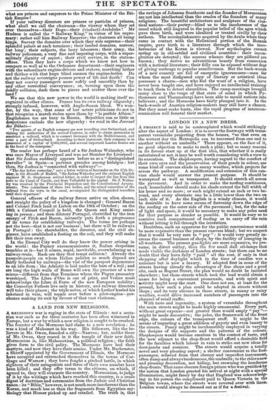LONDON IN A NEW DRESS.
A rnoracr is said to be contemplated which would strikingly alter the aspect of London : it into cover the footways with trans- parent verandahs projecting from the houses, "so that even on the wettest day the Metropolis can be traversed from one end to another without an umbrella." There appears, on the face of it, no good objection to make to such a plan ; but so many reasons in its favour start up at the first idea, that whether it is really entertained or not, it may be well worth considering with a view to its execution. The shopkeepers, having regard to the comfort of their own eyes and the preservation of their goods in colour, use some kind of canvass shade in sunny weather, which projects far across the pathway. A modification and extension of this can- vass shade would answer the present purpose. It should be waterproof as well as transparent. It should stretch all across the pavement. And in order to make the roofing continuous, each householder should make his shade extend the full width of his house and no more ; or each might extend an inch or two be- yond, and every alternate one be a little lower than the two on each side of it As the English is a windy climate, it would be desirable to have some means of fastening down the edge of the roofing on the outer side of the pavement ; but, for the sake of light and space, it would be necessary to make any poles used for that purpose as slender as possible. It would be easy so to contrive each compartment of roofing as to carry off the rain without letting it fall through the interstices.
Doubtless, such an apparatus for the public convenience would be more expensive than the present canvass blind ; but we suspect that it would be very sure to " pay " : it would very greatly in- crease the casual business of shops, by the facility of lounging in all weathers. The present gas-lights are more expensive, we pre- sume, in direct outlay, than the few small dull oil-lamps that made visible the darkness of London streets; but there can be no doubt that they have fully " paid " all the cost, if only in that shopping after daylight which in the time of candles was a nuisance but is now a luxury. If adopted first in some of the streets having already the advantages of fine shops and a good site, such as Regent Street, the plan would no doubt be imitated elsewhere ; but those streets which took the lead would obtain a name for being a convenient promenade, and with spirit and activity might keep the start. One does not see, at least for the present, how such a plan could be adopted in streets without shops ; and its very absence in those streets, in sunny or rainy weather, would drive increased numbers of passengers into the channel of retail traffic.
With taste and ingenuity, a system of verandahs throughout the main streets might be made highly ornamental. Every part, without great expense—not greater than would amply " pay "— might be made decorative; the poles, the framework of the front edge, the colours of the transparent stuff. It might be the means of imparting a great addition of gayety and even beauty to the streets. Fancy might be inexhaustibly employed in varying the designs of the supports and the patterns of the colours. Shopkeepers would become emulous in the contest of taste, and the new adjunct to the shop-front would afford a desirable field for the faculties which labour in vain to strike out new ideas for door-jambs and cornices. The streets would acquire a totally novel and very pleasing aspect; a shelter convenient to the foot- passenger, relieved from that clumsy and imperfect instrument, often damp and always burdensome, the umbrella; to the rider a new and pleasing decoration, not hiding, but crowning the handsome shop-fronts. That same obscure foreign prince who was gratified.b. y the notion that London greeted his arrival at night with a special illumination, might fancy by day that England was acknowledg- ing in his person the compliment paid to Queen Victoria in the Belgian towns, where the streets were covered over with linen. London would always be dressed out as if for a festival.


























 Previous page
Previous page